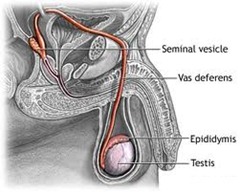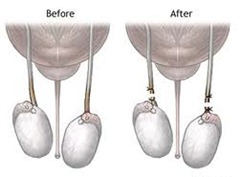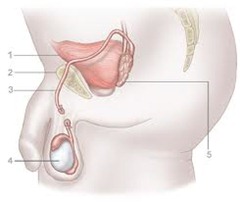A vasectomy is a permanent method of birth control, or sterilization, for men. It is a surgical procedure during which the tubes that runs from the testicular epididymis to the seminal vesicle are cut and tied, or sealed, so that sperm will not enter the ejaculate that is released during orgasm. The vas deferens are the tubes that run from the testicles through the scrotum to the seminal vesicle. Sperm is formed in the testicles and stored in the epididymis where they mature. During ejaculation, sperm flow from the epididymis and are transported through the vas deferens, to the seminal vesicle, where the fluid is diluted before ejaculation.
Although there is a possibility of reversible, it is not always successful, and it is both costly and complex to perform, so if you decide to have a vasectomy, you should think of it as a permanent operation. You should consider the psychological and emotional consequences. Many top urologists recommend that men undergoing a vasectomy preserve some of their sperm through freezing.
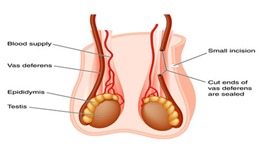 A vasectomy itself is not a difficult procedure, and is usually performed in a doctor’s office or clinic. There are several methods, and all methods involve sealing at least one side of each vas deferens tube. An experienced urologist, like Dr. Melman, will be able to determine the best treatment option in consultation with each individual patient.
A vasectomy itself is not a difficult procedure, and is usually performed in a doctor’s office or clinic. There are several methods, and all methods involve sealing at least one side of each vas deferens tube. An experienced urologist, like Dr. Melman, will be able to determine the best treatment option in consultation with each individual patient.
Traditionally, when performing a vasectomy, the urologist will numb the scrotum with a local anesthetic, and make two small incisions on either side, which will allow the urologist to access each vas deferens, which are then cut, separated, and sealed on at least one side by either suturing, electro cauterization, or clamping.
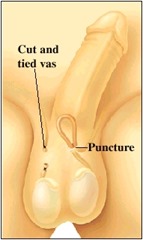 A variation, known as the “no-scalpel” vasectomy or “keyhole” vasectomy, is performed by puncturing the scrotal sac with a sharp hemostat. This results in quicker healing and a smaller chance of infection, as the incision is much smaller.
A variation, known as the “no-scalpel” vasectomy or “keyhole” vasectomy, is performed by puncturing the scrotal sac with a sharp hemostat. This results in quicker healing and a smaller chance of infection, as the incision is much smaller.
No-needle vasectomies allow urologists to apply anesthesia painlessly without a needle with a jet-injection device, which forces the anesthetic into the scrotal tissue. This type of anesthesia was devised for men who have a fear of needles. The rest of the procedure is the same, after the scrotum is anesthetized.
An open-ended vasectomy is named because the testicular end of the vas deferens is not sealed, and this sometimes decreases any long-term testicular pain that occasionally results from increased pressure back into the epididymis.
One cause of vasectomy failure is recanalization of the vas deferens. In order to prevent this surgical failure, a method known as fascial interposition was created. Fascia is fibrous tissue that surrounds the vas deferens. In fascial interposition, one end, the prostatic end, of the vas deferens is positioned outside of this fibrous sheath of tissue, decreasing the risk of vasectomy failure.
If you are considering a vasectomy as a method of permanent birth control, you should arrange a consultation with Dr. Melman, one of the top urologists in the United States. He sees patients by appointment in his New York City office. Contact Dr. Melman today to discuss a vasectomy.

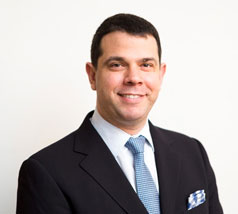 Dr. Larish is a urologist and surgeon treating women and men with a variety of urological conditions. His expertise is in treating complex kidney stones, enlarged prostates (BPH), incontinence, erectile dysfunction, infertility, and urological oncology (prostate, bladder, kidney, and adrenal cancers). He is an expert in general urology and is often consulted for second opinions.
Dr. Larish is a urologist and surgeon treating women and men with a variety of urological conditions. His expertise is in treating complex kidney stones, enlarged prostates (BPH), incontinence, erectile dysfunction, infertility, and urological oncology (prostate, bladder, kidney, and adrenal cancers). He is an expert in general urology and is often consulted for second opinions.



 A vasectomy itself is not a difficult procedure, and is usually performed in a doctor’s office or clinic. There are several methods, and all methods involve sealing at least one side of each vas deferens tube. An experienced urologist, like Dr. Melman, will be able to determine the best treatment option in consultation with each individual patient.
A vasectomy itself is not a difficult procedure, and is usually performed in a doctor’s office or clinic. There are several methods, and all methods involve sealing at least one side of each vas deferens tube. An experienced urologist, like Dr. Melman, will be able to determine the best treatment option in consultation with each individual patient. A variation, known as the “no-scalpel” vasectomy or “keyhole” vasectomy, is performed by puncturing the scrotal sac with a sharp hemostat. This results in quicker healing and a smaller chance of infection, as the incision is much smaller.
A variation, known as the “no-scalpel” vasectomy or “keyhole” vasectomy, is performed by puncturing the scrotal sac with a sharp hemostat. This results in quicker healing and a smaller chance of infection, as the incision is much smaller.